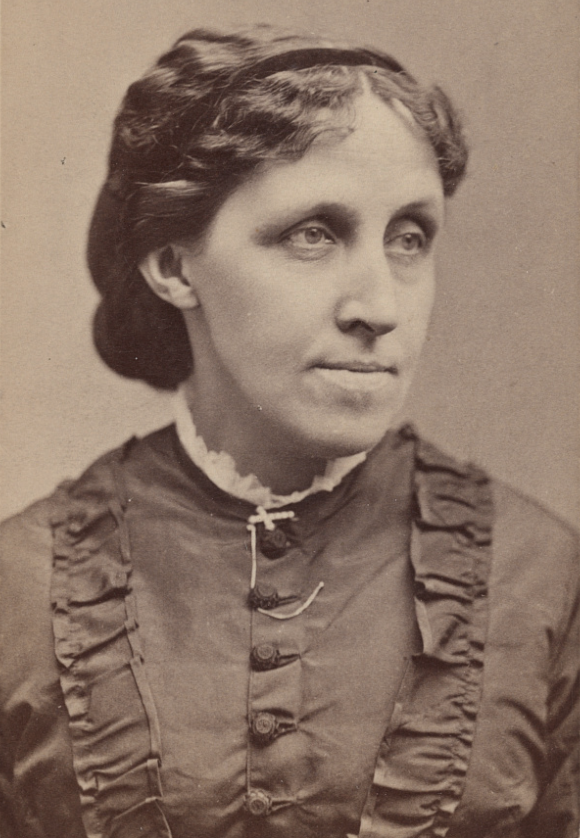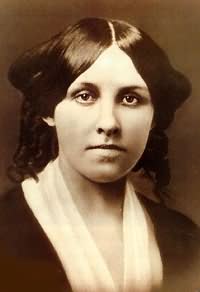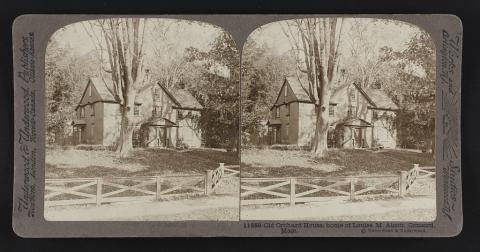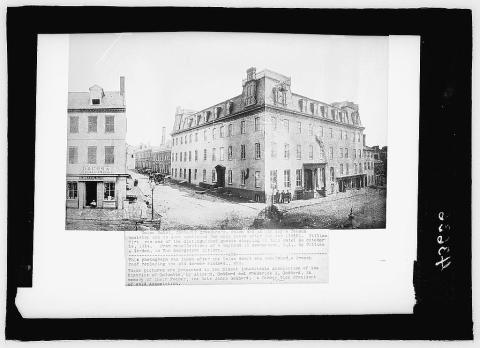
“The sight of several stretchers, each with its legless, armless, or desperately wounded occupant, entering my ward, admonished me that I was there to work, not to wonder or weep; so I corked up my feelings, and returned to the path of duty.”
- Louisa May Alcott, Hospital Letters
In many ways, Louisa May Alcott (1832-1888) was extraordinary. She grew up in Concord, Massachusetts, among the leading transcendentalist thinkers of the 1830s and 1840s, and she wrote the best-selling book, Little Women, published in 1868. Her father, Amos Bronson Alcott, was one of the odder reformers of the antebellum period. He was a firm believer in the perfectibility of humanity, and his educational theories, dismissed as hopelessly optimistic in his day, were surprisingly modern. His most radical experiment, though, was a utopian, self-sufficient farming community called Fruitlands that he founded in 1843 in Harvard, Massachusetts. It failed after seven months, and his family almost starved. He never had enough money. Louisa May had to write to make a living. She found success and fame with Little Women, a beloved novel based on her own childhood experiences. It has been adapted into four major movies.
Image: A portrait of American author Louisa May Alcott taken eight years after she worked as a Civil War nurse. Photograph by George Kendall Warren. (1870).
In other ways, Louisa May Alcott was typical. Her life showed many of the larger cultural forces shaping the Northern middle class in the decades before the Civil War. Little Women celebrates nineteenth-century domesticity and homes centered on women and girls. Domesticity was a belief of famous people like Catharine Beecher that they put out in popular advice books. Domesticity said that women were morally superior to men and that women had a duty to create a nurturing, pure, utopian home that would make men and children become morally good. When outside events threatened the home, and when the economy or political leaders failed to meet the moral standards of Northern middle-class domesticity or femininity, it became the duty of women to do something, even if they had to leave the home.
Louisa May Alcott left home in 1862. She spent six weeks working as a nurse at the Union Hospital in Washington, D.C., before she got sick with typhoid fever and almost died. She used the letters she had written to her family in her first book, Hospital Sketches, published in 1863. The book’s main character, Tribulation Periwinkle, is based on Alcott herself. She said, like so many women of the North at the start of the Civil War, “I want something to do.” Some women sent supplies to their men in uniform. Some organized “Sanitary Fairs” to raise money for the United States Sanitary Commission, and some became Union Army nurses who were supervised by Dorothea Dix, the asylum reformer.

Hospital Sketches describes a journey to Washington. Immediately upon her arrival, Tribulation Periwinkle must care for wounded men newly arrived from the Battle of Fredericksburg. She met “a regiment of the vilest odors that ever assaulted the human nose,” and “armed with lavender water,” began her work. The hospital challenged her beliefs about femininity. Alcott wrote, “The sight of several stretchers, each with its legless, armless, or desperately wounded occupant, entering my ward, admonished me that I was there to work, not to wonder or weep; so I corked up my feelings, and returned to the path of duty.” She learned how to dress wounds.
Alcott was deeply offended by the insensitivity of the male surgeons, who did amputations without ether, the anesthetic of the time. Overall, however, Hospital Sketches is surprisingly positive and even funny. The real experiences of Civil War nurses must have been traumatic. In a letter she wrote to her friend Hannah Stevenson, Alcott wrote that “half a dozen stumps are waiting to be wet & my head is full of little duties to be punctually performed.” This was hardly the lovely world she wrote about in Little Women.
Alcott’s time as an Army nurse was cut short when she came down with the same illness that took the life of Abraham Lincoln’s son, Willie, in 1862. Typhoid fever made Alcott a patient, not a caregiver. In a journal entry for February, 1863, she wrote, “Recovered my senses after three weeks of delirium, and was told I had had a very bad typhoid fever, had nearly died, and was still very sick. All of which seemed rather curious, for I remembered nothing of it. Found a queer, thin, big-eyed face when I looked in the glass; didn't know myself at all; and when I tried to walk discovered that I couldn't, and cried because my legs wouldn't go.” Civil War hospitals were clearly dangerous places for both the body and the mind. Alcott’s time in Washington was brief, and she seems not to have gotten any permanent physical disability. Others were not so lucky. Some nurses were physically disabled because of their service. Something like post-traumatic stress disorder must have affected many former nurses.
About 18,000 women worked in Union military hospitals during the war. Most did not have Louisa May Alcott’s privileged status. None got pensions until Congress passed the Army Nurses’ Pension Act of 1892. Even then, they had to prove in their application that they were “morally deserving.”
For more information on nurses, see the article on U.S. Sanitary Commission.
Sources:
- Louisa May Alcott. (1857). Unknown photographer. Wikimedia Commons.
- Louisa May Alcott. (1870). Photograph by George Kendall Warren. Library of Congress.
- Alcott, Louisa May. (1863). Hospital Sketches. Boston: James Redpath. Internet Archive.
- Clara Barton and the Medical Disaster of First Bull Run. (2019, July 15). Clara Barton Museum.
- Konrad, Kevin. (2011, July 5). “Scenes from the Hurly Burly Hotel: Louisa May Alcott’s Civil War.” Smithsonian, National Museum of American History.
- Massachusetts Historical Society Collections Online: Letter from Louisa May Alcott to Hannah Stevenson. (1862, December 26). Retrieved April 24, 2022.
- National Photo Company. Georgetown’s Union Hotel Hospital. Photograph. (c1910). Library of Congress.
- The Project Gutenberg eBook of Louisa May Alcott, Her Life, Letters, and Journals, by Louisa M. Alcott. (2011, November 18). Retrieved April 24, 2022.
- Schultz, J. E. (1994). Race, Gender, and Bureaucracy: Civil War Army Nurses and the Pension Bureau. Journal of Women’s History, 6(2), 45–69.
- Silber, N. (2005). Daughters of the Union: Northern Women Fight the Civil War. Harvard University Press.





